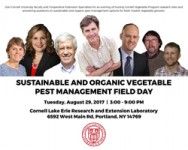Event Details
Date
August 29, 2017
Time
3:00 PM - 9:00 PM
Location
Cornell Lake Erie Research and Extension Laboratory
6592 West Main Rd
Portland, NY 14769
Cost
$25.00 CVP enrollee
(additional attendee $25.00 ea.)
$35.00 Non-CVP enrollee
(additional attendee $35.00 ea.)
includes dinner if pre-registered by August 23
At the Door
$35.00 walk-ins
Dinner not guaranteed unless pre-registered by 8/23/17
Host
Cornell Vegetable ProgramDarcy Telenko
716-697-4965
email Darcy Telenko
EVENT HAS PASSED
Sustainable and Organic Vegetable Pest Management Field Day
August 29, 2017
Join Cornell Vegetable Program Specialists (Telenko, Hadad, Reid) and Cornell University faculty (Wallace, Smart, Reiners, Bjorkman) for an evening of touring Cornell Vegetable Program research sites and answering questions on sustainable and organic pest management options for fresh market vegetable growers. Information will be provided for both conventional and organic growers at all levels of expertise. Network for Environmental and Weather Application (NEWA) will be on-hand to teach growers how they can use the forecasting models for pest management in various crops. Sponsoring industry representatives will have the opportunity to meet with growers to comment on their products.
3.0 DEC and CCA credits will be available.
TOPICS
This session will review weed management options in vegetables and herbicide best use practices. Both organic and conventional weed management tools will be discussed including the use of a stale-seed bed technique with either herbicide or flame-weeder burn-down treatment. Growers will be able to view the different weed management tools, look at the economics of utilizing each system, and ask questions. Topics will also include how to scout after herbicide application to confirm usefulness. Growers will be encouraged to actively participate, and ask questions about the proper use of herbicides in vegetables.
2017 Vegetable Disease Update and Tour of Organic Weed and Disease Management Trials -- Darcy Telenko and Christine Smart, Cornell
Telenko and Smart will discuss the major vegetable diseases in New York, what symptoms we are looking for, and conventional and organic management tools available including resistant varieties, fungicides and new biopesticides. Research trials will be showcasing varieties with host resistance and organic programs using disease forecasting. Information will be provided for both conventional and organic growers at all levels of expertise.
Insect Management and Specialty Crop Vegetable Variety Demonstration -- Robert Hadad, CVP
The group will walk the fields to learn and practice skills necessary to identify insect pests, discuss control options and management issues that affect insect control. A number of varieties of a diverse assortment of vegetable crops will be on display for grower viewing.
Update on NEWA -- Dan Olmstead
Dan will discuss NEWA (Network for Environmental and Weather Application) and how growers can use the forecasting models for pest management in various crops.
Sulfur Fertility in Vegetable Crops -- Steve Reiners, Cornell
Correct crop fertility has wide reaching impacts on yield, and more is often not better. Excessive fertility can promote weed growth and insect pressure, while insufficient nutrition leaves crops more susceptible to stresses like disease. Dr. Reiners will direct his discussion on the importance in sulfur to maintain healthy vegetable crops.
Using Cover Crops for Soil Health --Thomas Bjorkman, Cornell
Cover crops have become an important tool for improving soil health. This session will view a number of cover crop options and talk about the benefits of use cover crops and how to incorporate them into a vegetable rotation. Growers will be encouraged to discuss their experiences with cover crops.
Northeast Broccoli Project -- Thomas Bjorkman
Dr. Bjorkman will update the Northeast Broccoli Project and variety evaluation.
Season Extension -- Judson Reid, CVP
Judson will discuss best management practices and options for season extension in vegetables. He will review health, fertility and pest management requirements for successful production.
Sweet Corn Variety Trial and Tasting, Followed by Dinner
Update on Ongoing Research Projects in the Region/Visit Sponsors
Registration for this event includes dinner and handouts. Register online (using the link above) or call 716-652-5400.
This event is sponsored by BASF, Gowan, and Marrone Bio Innovations. Additional meeting supplies provided by Harris Seeds Organic.



































